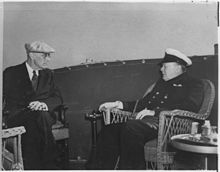| Malta Conference ARGONAUT CRICKET | |
|---|---|
 Franklin D. Roosevelt and Winston Churchill at the Malta Conference | |
| Host country | |
| Date | January 30 – February 3, 1945 |
| Venue(s) | Montgomery House |
| Cities | Floriana, Malta |
| Participants | |
| Precedes | Yalta Conference |
The Malta Conference was held from January 30 to February 3, 1945, between President Franklin D. Roosevelt of the United States and Prime Minister Winston Churchill of the United Kingdom on the island of Malta. The purpose of the conference was to plan the final campaign against the Germans with the Combined Chiefs of Staff (the United States Joint Chiefs of Staff and the British Chiefs of Staff Committee). Politically, the overriding purpose was to present a united front against Stalin in the Yalta Conference a few days later. That did not happen once Yalta began, much to Churchill's disappointment. Both leaders agreed on the undesirability of the Red Army advancing into central Europe.
Contents
The Conference was given the code names of ARGONAUT and CRICKET, as well as several others.
The Malta Conference began on January 30, 1945, but Roosevelt did not arrive until February 2, the last day of the conference. [1]
